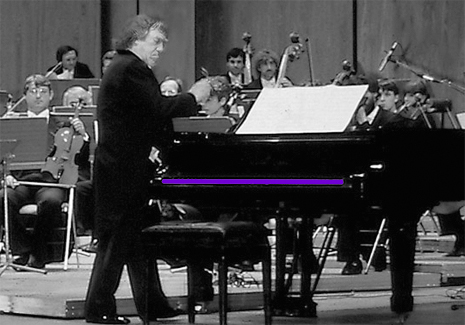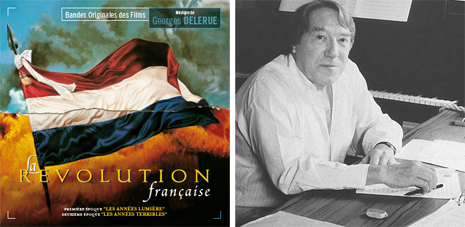| Vive la Music Box |
| The founders of Music Box Records discuss their upcoming releases. |
| By Gergely Hubai |
|
Back in 2010, French film music enthusiasts Laurent Lafarge and Cyril Durand-Roger had the idea of founding their own record label, focusing on the film music heritage of their home country. Four years later, Music Box Records has released more than 50 CDs, expanded its portfolio with significant releases of Hollywood films, and has now ventured into the world of soundtrack distribution as well. Lafarge and Durand-Roger speak to FSMO about the lessons they learned over the past four years and what the future holds for French film music. Gergely Hubai: How did your interest in film music begin? Music Box Records: We have always been passionate about film soundtracks, going as far as back as our teenage years. In the ’90s, we launched a fan-based review, “Music Box: pellicule sur écoute,” where we and a couple of other enthusiasts interviewed composers and reviewed CDs. We had our own professional experiences for a few years, but decided to start a label dedicated to French film music in 2010—we felt there was no real label that represented the kind of soundtracks we wanted to see released. We named the label after our old fanzine: “Music Box” represents the connection between movies and soundtracks. GH: So how long did it take to set up the label? MBR: We first thought about doing the label in September 2010 and officially created Music Box Records within a month. Our first CD was Georges Delerue's L'Incorrigible/Va Voir Maman, Papa Travaille, which was issued in February 2011. GH: Who are some of the composers you regularly work with? MBR: We work closely with Éric Demarsan, Serge Franklin, Philippe Rombi and Gabriel Yared to name a few. When they own the material, it’s much easier for us to make a quick and efficient release; it’s also a good way to make a more complete release of a score that’s already been released. In general, we can say that when a composer took the time to back-up his old master tapes, he is mostly very happy to give us access to the personal archives. Sometimes, we’re given free hand, but other times we’re happy to work with the estates. Colette Delerue (Georges’ widow) is a great help in our releases—she’s very involved in the process from selecting the cues to editing and mastering. As an editor, she has a very keen ear for these sorts of things. GH: Apart from French film scores, you’ve also released about a dozen American scores by Hollywood studios. Was this always the goal when you started Music Box Records? MBR: We didn’t think about this when we set up the label, but as time went by, we knew we had to give more exposure to our label with some American titles —after all, some of our own favorite scores were written for American films. The first Hollywood studio we worked with was MGM—our first MGM release was Alan Silvestri’s Overboard. Since then we’ve also done MGM scores written by French composers (Visit to a Chief's Son by Francis Lai and The House on Carroll Street by Georges Delerue), some personal favorites that hadn’t been released before (The Fourth War by Bill Conti) and some terrific comedy scores (Clean Slate by Silvestri, Fitzwilly by John Williams and She-Devil by Howard Shore). Our 50th anniversary title was also an MGM film: Golden Needles by Lalo Schifrin. GH: From the perspective of production, is there anything different between releasing American and French scores? MBR: Yes, with American titles, we deal exclusively with the studios. We get the tapes and the artwork from them —and this happens with some of the bigger French publishers as well. The real difference is when we deal with smaller French or independent films, producers or publishers may hold the rights but don’t own a copy of the music, for instance. In this case, we not only have to make the contracts but also find the music. Some of our Delerue titles fall into this category. After finding out who holds the rights and make contracts, we have to contact Colette Delerue to use her own personal copies of the scores or the master tapes for the release. GH: You’ve done quite a number of Delerue scores, including some of his television output. Is he a favorite of yours? MBR: Oh yes, we have a huge respect for Delerue’s work and every new issue of his previously unreleased scores is an honor to do. I think everybody’s familiar with what he did on films like Contempt or Platoon, but he did some truly amazing stuff for French television that’s been barely looked at with the possible exception of Prometheus Records.
When we do something obscure like Les Visiteurs or Le Mythomane, it’s like discovering new gems. But the surprises are not limited to just television: When we did American Friends last year, we only knew the short suite from compilations —the full score reveals that the score is a lyrical masterpiece, and sadly one of Delerue’s last works. Getting on board with actor and screenwriter Michael Palin (of Monty Python fame) was a real thrill too! GH: Limited edition soundtracks are basically the norm with specialty labels now and it may be hard to decide how many copies to make of each album. Have you ever been pleasantly surprised or disappointed? MBR: Well, releasing soundtracks is a very exciting experience with its ups and downs. We had some good surprises, like Silvestri's Overboard or Garvarentz's Killer Force/The Corrupt Ones. We never thought that they would sell so well. On the other hand, we were very disappointed by sales of other CDs that would deserve more interest from soundtracks enthusiasts. She-Devil (Shore), Clean Slate (Silvestri) and Tough Guys Don't Dance (Angelo Badalamenti) are great symphonic scores filled with strong melodies, composed by famous international composers. GH: How long do you usually work on a project? MBR: That depends on a number of factors. Usually, it’s between three and six months, but we’ve had several projects that could take years from conception to release. One of our best-selling titles was John Williams’ Fitzwilly, which had some special audio issues we had to sort out, so that was among the longer projects. Our latest announced title, The French Revolution by Georges Delerue, is also among those that took a long time to produce.
MBR: The French Revolution is a huge, two-part film that runs for six hours and has an international cast that includes people like Klaus Maria Brandauer, Jane Seymour, Peter Ustinov and Claudia Cardinale. It was made in 1989 for the 200th anniversary of the revolution but it wasn’t a very big financial success, so it’s not that well-known in France either. Delerue’s score is, of course, fantastic and there was a 2-LP set by Polydor when the film was released. Our 2-CD set contains the original Polydor programs, transferred from the original master tapes, which is followed by 35 minutes of previously unreleased music from the composer’s own archives. It will be a deluxe edition (as we did for The Outsiders) to celebrate the 25th anniversary of the film. Since the score is out-of-print and goes for astronomical sums on eBay, we hope that our limited edition will be a delight for fans that missed out on previous issues. GH: Could you tell us a bit more about your new soundtrack distribution service? Why did you choose to distribute other labels’ CDs as well? MBR: We simply felt that our business should grow alongside the label. It’s been already mentioned that there’s no real soundtrack label focused on issuing previously unreleased French soundtracks, but there’s another problem: There’s no French online store devoted to selling soundtracks either. Now, apart from selling our own releases, we carry the CDs of most specialty labels. It’s a tough job running a web store and a label at the same time but we have a couple of new ideas, too. For instance, we’ve started a loyalty program in our online store: For every purchase made on our website, the customer receives points that can be converted into coupons and discounts. As far as we know, we’re the only specialty soundtracks store that offers this! GH: So what’s coming up from Music Box Records that you can already tell us? MBR: Apart from The French Revolution, we’re also working on another very sought-after Delerue title from the late ’80s —it will be the expanded version of a beloved score of his. Let the guessing game begin! We’re also expanding our roster with a French composer whom we haven’t released before and, of course, we’re also keeping up with current French films. We’ve just done the Sepp Blatter biopic United Passions with music by Jean-Pascal Beintus (one of Alexandre Desplat's orchestrators)—this is a download-only release. —FSMO
|


